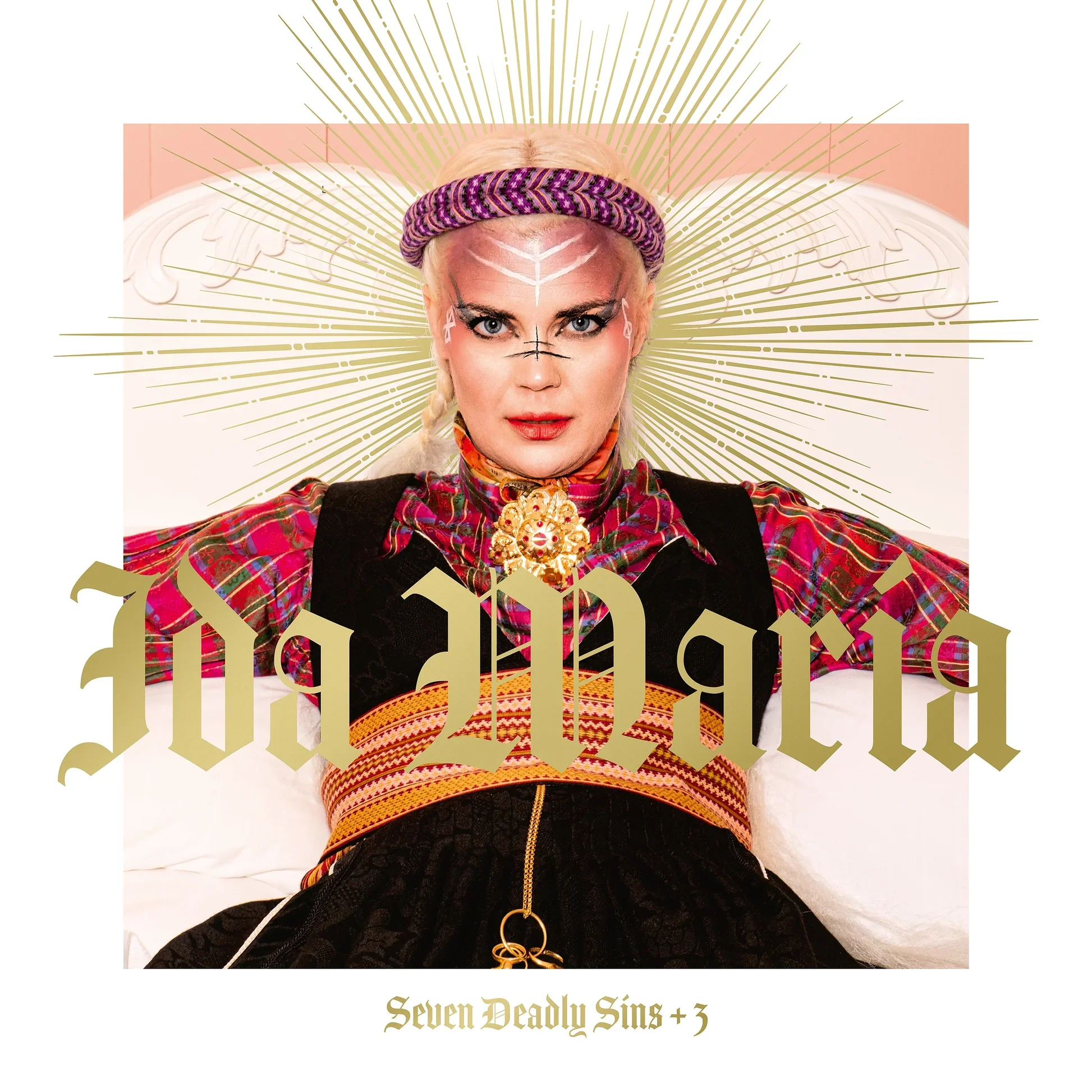Ida Maria: Seven Deadly Sins + 3
Norwegian rocker Ida Maria has always thrived on confrontation, whether shouting her way through indie-club anthems like ‘I Like You So Much Better When You’re Naked’ or writing bruised, confessional ballads. With ‘Seven Deadly Sins + 3’, her first full-length album since 2016’s ‘Scandalize My Name’, she takes that instinct and shapes it into a concept: examining human flaws through the lens of the seven deadly sins, plus three additions of her own.
Written and recorded after years of navigating the music industry on her own terms, the record blends raw garage-rock energy with sharp pop hooks, revisiting the themes of shame, desire, anger and resilience that have always coursed through her work. It’s both a comeback and a statement of intent, reasserting Maria’s place as one of Scandinavia’s most fearless voices.
The album kicks off with ‘Lazy’, a swaggering opener that sets the tone immediately. Over a jagged guitar riff and stomping beat, Ida Maria leans into a half-snarled, half-playful delivery that turns inertia into an anthem. What could read as self-indulgence on paper comes across instead as defiant honesty: a refusal to apologise for exhaustion, disinterest, or opting out of the grind. The chorus lingers with a wry catchiness, making ‘Lazy’ sound less like a weakness and more like a reclamation of space. As an introduction, it’s sharp, funny and uncompromising, reminding listeners that Ida Maria’s bite is as intact as ever.
‘Envy’ follows with a darker, more simmering energy. Where ‘Lazy’ shrugged off expectations with humour, this track digs into comparison and resentment, carried by a tense bassline and sharp, almost accusatory vocal phrasing. Maria doesn’t soften the emotion, instead she leans into its ugliness, spitting out lines that capture the corrosive pull of wanting what others have. The arrangement keeps the tension wound tight, layering distortion and echo until it feels almost claustrophobic. It’s not a flattering portrait, but that’s the point: ‘Envy’ stares directly at one of humanity’s most uncomfortable impulses and refuses to look away.
With ‘I Pushed Too Hard’, Ida Maria pivots from searing confession to self-reckoning. The track trades the sharp edges of ‘Envy’ for a driving, almost desperate momentum: guitars chug forward as her vocals crackle with urgency. The track feels like the aftermath of indulgence, when ambition or desire tips into self-destruction. There’s a bruised honesty in the way she repeats the refrain, sounding less like a boast and more like an admission. The song balances punk rawness with an ear for melody, turning regret into something cathartic and oddly uplifting.
‘Lust’ turns the heat up, one of the record’s most immediate and visceral cuts. Ida Maria’s delivery is both taunting and vulnerable, stretching between sultry whispers and ragged shouts as the song leans into its theme without restraint. The instrumentation mirrors that volatility, jagged guitars slash through a pulsing rhythm section, giving the track a raw, almost dangerous momentum. What makes it compelling is the lack of gloss: ‘Lust’ isn’t polished or coy, it’s messy, urgent and physical, capturing desire in all its intensity. It’s a reminder of Maria’s knack for transforming uncomfortable truths into something exhilarating.
If ‘Lust’ embodied unfiltered desire, ‘Pussy and money’ dives straight into provocation. The track is brash and unapologetic, wielding it’s title like a dare, with Maria spitting out lines over a grinding, riff-heavy backdrop. There’s a deliberate crudeness here, the kind that skewers shallow obsessions by exaggerating them to the point of parody. At the same time, the song doesn’t feel like a joke, the performance is too raw, too insistent, underscored by a chorus that sticks. It’s Ida Maria at her most confrontational, holding up a mirror to excess and daring listeners to decide whether to laugh, squirm or sing along.
Ida Maria steps back from sin-themed self-examination to take on a bigger cultural question with ‘Who Will Save Rock and Roll’. It’s a fiery, tongue-in-cheek rallying cry that doubles as both a lament and a dare, pushing back against the idea that guitar music is a relic. The track charges forward on crunchy riffs and a stomping beat, Maria’s vocals pitched between defiance and desperation. There’s irony in the phrasing, she’s not exactly handing down a sermon, more sparking a fight but underneath the humour lies a genuine urgency. It’s one of the album’s most anthemic moments, a reminder of her ability to merge punk bite with a pop-savvy hook.
The album closes with ‘Black Eyed Hill’, a strikingly different mood from the chaos and confrontation that precedes it. Stripped back compared to the other tracks, it carries a haunted, almost hymn-like quality, with Maria’s voice pushed to the forefront. There’s weariness in her delivery, but also resilience — as if the entire journey through sins and excess has led to this quiet reckoning. The instrumentation builds slowly, layering atmosphere rather than aggression, and the effect is both somber and cathartic. As a finale, ‘Black Eyed Hill’ lingers like an echo, suggesting that after all the fury and indulgence, what remains is reflection.
’Seven Deadly Sins + 3’ is not an album tied together by one clear sonic thread and that’s both it’s strength and it’s weakness. At times, the shifts in style can feel disjointed, pulling the listener from snarling punk to ragged confession to tongue-in-cheek satire without much warning. But Ida Maria has never been about tidiness, and here the lack of cohesion is partly the point: vice is messy, contradictions coexist, and no single sound could capture all of it. What the record does achieve is a sharp, unflinching look at human flaws, delivered with Maria’s trademark blend of humour, vulnerability and bite. If nothing else, ‘Seven Deadly Sins + 3’ proves that she remains fearless in both theme and execution and overall a voice willing to risk rough edges in pursuit of something true.

